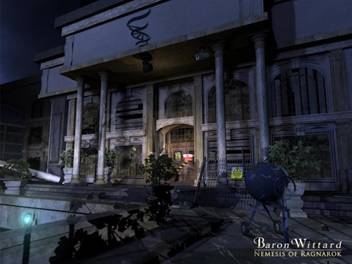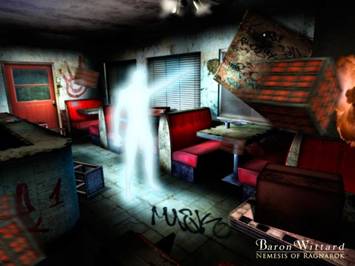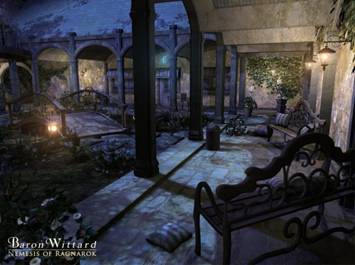Let’s get this straight right from the beginning; Baron Wittard is a hard game. When I say hard, I mean that I was stumped by the very first level. It’s a combination of point ‘n’ click adventure, with puzzle-solving, and only hardcore fans of both genres will want to take a look at Barron Wittard. This game will melt your brain if you aren’t heavily into hunting for hidden switches and trial & error logic puzzles.
As is usual for adventure games, you find yourself
investigating a mystery; you’re a lone journalist sent to have a look at a
failed architectural project that was built by the eccentric architect Baron
Wittard. He constructed a utopian
self-contained city, but the project went awry and your editor wants you to
find out what happened. The idea
of exploring a failed utopia is rather reminiscent of Bioshock, and it does at
times feel like you’re exploring Andrew Ryan’s Rapture. Of course, being an adventure game,
there’s no shooting or combat, you progress through the various rooms and
tunnels of Wittard’s Utopia by solving a series of elaborate puzzles to unlock
hidden entrances that the Baron put up to keep out interlopers. The story is told through NPC monologs; your character is
silent, but you do get calls on a cell phone, eavesdrop on NPC, Most of the NPC
voice work is flat, and subpar.
Fortunately, the most talkative of the NPC’s is Baron Wittard himself,
and he has the best voice actor in the game. Early on, you learn that the Baron is dead, but you find a
magic Viking amulet which lets his spirit communicate with you.
The story is told through NPC monologs; your character is
silent, but you do get calls on a cell phone, eavesdrop on NPC, Most of the NPC
voice work is flat, and subpar.
Fortunately, the most talkative of the NPC’s is Baron Wittard himself,
and he has the best voice actor in the game. Early on, you learn that the Baron is dead, but you find a
magic Viking amulet which lets his spirit communicate with you.
While this story and setting are interesting, you’re going
to spend most of the game clicking your way through hallways and rooms trying
to hunt down inventory items, and clues to solve the game’s many puzzles. These item hunts are rather brutal,
because the areas tend to be quite large, and you have to explore every single
inch of a given area in order to find hidden switches, or scraps of paper that
might hold useful information.
This is inconvenient enough as it is, but when combined with the puzzle
design, this game becomes extremely frustrating. 
Many of the puzzles can be solved through pure logic and
observation. Others can only be
solved once you find the right key item, or clue. Often you’ll end up poking away futilely at a puzzle before
giving up in frustration, and then stumble across the clue later on. Other times, you might run around
trying to find a clue when the puzzle doesn’t have one at all.
Worse still, there is no “Dumbass Mode” to offer hints when you get stumped. If you Just Don’t Get It on one of the puzzles, you’ll have to turn to an online walkthrough, and some gamming forums already have posts from people stumped by the very first puzzle.
Of course there are people who LIKE this sort of thing. Going from room to room, randomly
wiggling your mouse over ever square inch of the screen just to find a
concealed scrap of paper that contains a secret code is a rewarding challenge
to some gamers. The same is true
for people who can stare at a cunning puzzle for half an hour before screaming
“I get it”. I’ll give the
developers credit for creating some great challenges, and it is very satisfying
when you figure out a puzzle, or deduce where a useful item might be hidden
away. However most of the game is spent floundering around in frustrated
confusion. You navigate the Baron’s world through point and click
controls. It’s entirely in the first person perspective, and each area is
designed with a 360 degree panoramic view, so every section of a room or
hallway appears to directly connected to the adjoining areas. You move from area to area by aiming
and clicking on the center of the screen.
It looks good and controls well, but the problem arises that many of
these areas are just for show; they don’t contain any objects or puzzles that
you can interact with, but you still have to click your way through them to get
to somewhere interesting.
You navigate the Baron’s world through point and click
controls. It’s entirely in the first person perspective, and each area is
designed with a 360 degree panoramic view, so every section of a room or
hallway appears to directly connected to the adjoining areas. You move from area to area by aiming
and clicking on the center of the screen.
It looks good and controls well, but the problem arises that many of
these areas are just for show; they don’t contain any objects or puzzles that
you can interact with, but you still have to click your way through them to get
to somewhere interesting.
During my time with the Baron I veered wildly between boredom, frustration, and the occasional burst elation when I solved a tough puzzle, or discovered a cleverly hidden clue. I think most gamers will feel the same way, and are likely to lose interest in Baron Wittard pretty quickly. The story isn’t enough to hold a disinterested player’s attention as they wander around searching for the next hint, clicking their way through empty rooms.
That said, I suspect that the good Baron will develop a cult following of hardcore adventure/ puzzle fans who take pride in beating this sort of game. If you managed to solve The Longest Journey’s Rope/Clamp/Duck puzzle without resorting to a walkthrough, then you should consider visiting Baron Wittard’s utopia.